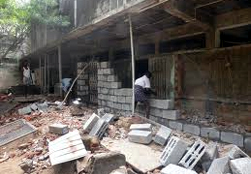First food: business of taste
Good Food is First Food. It is not junk food. It is the food that connects nature and nutrition with livelihoods. This food is good for our health; it comes from the rich biodiversity of our regions; it
Good Food is First Food. It is not junk food. It is the food that connects nature and nutrition with livelihoods. This food is good for our health; it comes from the rich biodiversity of our regions; it
The process of getting green clearances is turning into an “official extortion cell”, Mr Navin Raheja, President, National Real Estate Development Council, said here. Calling for doing away with green
PUNE: Indian cities are extremely ill prepared to address the environmental fallouts of the aggressive building construction that is underway, according to Centre for Science and Environment. A statement
As India's capital, Delhi has grown across sectors - industry, transport, and housing - which contribute to an increase in air pollution. This, in turn, has increased health risks, which are refl ected
The operators of commercial spaces such as malls, shops and other such establishments in Uttar Pradesh have won their supposed fight for customers’ right to shop and spend leisure time in a comfortable
The Centre for Science and Environment, in a report, has tore apart the Bruhat Bangalore Mahanagara Palike (BBMP)’s projection of facade of development with an unrealistic budge. The report brings out the City’s failure to manage its sewage and precious water. CSE director Sunita Narain aptly puts it, “Bangalore is drowning in its own excreta.” Sunita was quick to emphasise that Bangaloreans were by no means “unique”. At the launch of the seventh edition of the CSE State of India’s Environment Report titled ‘Excreta Matters’, she said cities across the country were doing equally bad.
The City’s rapid growth has come at a heavy price – in the form of the loss of its lakes and ponds, according to a Centre for Science and Environment (CSE) report. “These water bodies are now either repositories for sewage or have been turned into prime real estate,” a study conducted by the CSE revealed. “As a result, even with huge investments and projects for bringing water to the City – including the much debated Greater Bangalore Water and Sanitation Project (GBWASP) – the water crisis has become real and regular,” the report said.
This Presentation on "Facing the Sun: Policy for sustainable grid-connected solar energy" was delivered by Jonas Hamberg, Centre for Science and Environment, during the round table on solar energy policy,
Although India is facing a construction boom, only three per cent of its buildings can be certified as green. Experts expressed concern as to why the building sector remains unregulated especially since
A green NGO today warned against environmental debacle in Indian cities if resource guzzling and waste generation in the building construction sector is not minimised. Noting that Indian cities are

CSE warns against environmental debacle in Indian cities if resource guzzling and wastes in the building construction sector is not minimised.